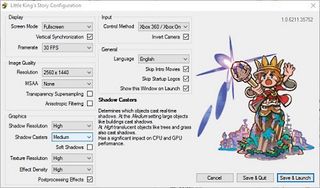Durante helps fix Little King's Story PC port with improved 60 fps and graphics options
The game "re-launched" today with a big patch that promises to dramatically improve performance.

The PC port of Little King's Story, released last year, is not what you'd call a flawless piece of software. It's a clever (and very Japanese) real-time strategy game, but Steam reviews are "mixed," currently about one-third negative, and a quick glance makes it clear that technical issues are the reason. XSeed spent months adapting the game to PC, but ultimately released it with a buggy 60 fps option and frequent stuttering and audio problems.
To address those problems, publisher Xseed Games teamed up with Peter "Durante" Thoman, a regular amongst the pages of PC Gamer, to overhaul the port completely.
Durante explained in a guest post on the Xseed Tumblr that executive VP Ken Berry contacted him a few months ago to ask if he could help improve the port. He said he hadn't been following the PC version of the game, but "was intrigued to see what was wrong with it, and delighted at how Ken was able to provide me with the source code for the game without too much bureaucracy." But he quickly realized that the job would be more difficult than he had anticipated.
"Little King’s Story was built on a custom engine designed from the ground up for this particular game, and its particular original target platform (the Wii)," he wrote. "Clearly, during its development, it was seen as a one-off project that would be done once it ships, and portability or maintainability were secondary concerns."
The explanation of his process isn't excruciatingly detailed, but it does get a little technical: He learned that the CPU was being bogged down by the DirectX 9 API, for instance, and so by "implementing various caches (for passes and materials) which prevent state changes unless they are necessary," he was able to improve framerates by more than 50 percent. He was also able to improve issues with intermittent stuttering, tweaked "framerate-dependent speed mismatches" to improve 60 fps playability, and added a 30 fps toggle that can be triggered in-game for players who'd rather switch when those issues arise. On top of all that, he added new graphical options, improved the launcher, and upgraded the controller support.
"The new version of Little King’s Story should perform significantly better on all systems, most sources of significant stutter should be eliminated, and the 60 fps mode now provides an accurate (and smoother compared to 30 fps) experience except in some scripting-related cases. Furthermore, the game now features additional graphics options to make better use of high-performance GPUs, and can be more precisely controlled with analog gamepads," Duirante wrote. "While I couldn’t achieve everything I initially wanted to—arbitrary fps and even a completely perfect 60 fps mode prove intractable for this game—I’m happy that Xseed gave me the chance to contribute a lot more directly and meaningfully to the quality of this PC port."
To mark the "re-launch" of Little King's Story, Xseed has it on sale on Steam for 40 percent off, dropping it to $15/£11/€14 until February 9. The update is currently only live on Steam, but Berry said it should be rolled out for GOG and the DRM-free version soon. The full patch notes are below.
PC Gamer Newsletter
Sign up to get the best content of the week, and great gaming deals, as picked by the editors.
- A variety of optimizations for overall performance improvements.
- Added multisampling anti-aliasing, transparency supersampling anti-aliasing and anisotropic filtering options.
- Implemented analog controls for Xinput-compatible gamepads.
- Improved 60 FPS mode by fixing simulation time progression rate, speed of many effects and object animations, and the movement speed of NPCs and animals. However, some scripted movements during boss battles might still be sped up or broken, so added a workaround where you can press “F1” to enable a temporary 30 FPS lock in 60 FPS mode.
- Replaced the game launcher with a new version with many usability improvements.
- Fixed save game playtime being calculated incorrectly.
Andy has been gaming on PCs from the very beginning, starting as a youngster with text adventures and primitive action games on a cassette-based TRS80. From there he graduated to the glory days of Sierra Online adventures and Microprose sims, ran a local BBS, learned how to build PCs, and developed a longstanding love of RPGs, immersive sims, and shooters. He began writing videogame news in 2007 for The Escapist and somehow managed to avoid getting fired until 2014, when he joined the storied ranks of PC Gamer. He covers all aspects of the industry, from new game announcements and patch notes to legal disputes, Twitch beefs, esports, and Henry Cavill. Lots of Henry Cavill.
Most Popular






